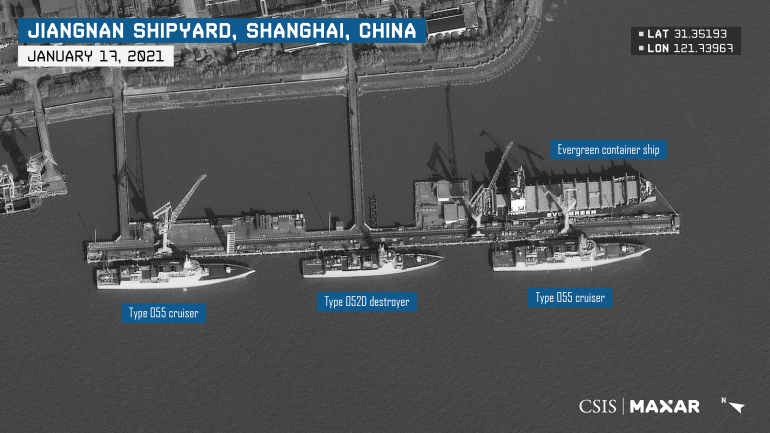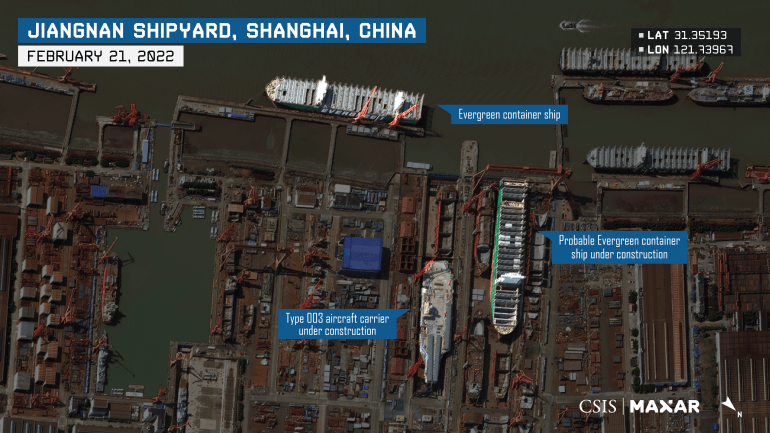Foreign orders boost China shipbuilding firm linked to military
US think tank says shipping firms need to reconsider approach given shipyards links to military.

Chinese shipyards that are at the heart of Beijing’s drive to modernise its navy are also seeing orders and technology transfer worth billions of dollars from commercial shipping companies in dealings that researchers say could inadvertently help the Chinese military’s modernisation plans.
The Center for Strategic and International Studies (CSIS) says the evidence suggests profits from foreign orders are probably helping “lower the costs of upgrading China’s navy”.
Keep reading
list of 4 itemsChina angered as US sends destroyer through Taiwan Strait
Russia’s Sarmat and China’s YJ-21: What the missile tests mean
Why is the Solomon Islands-China security pact causing alarm?
China is the biggest builder of large ocean-going vessels in the world and its top shipyard – China State Shipbuilding Corporation (CSSC) – controls 21.5 percent of the global commercial shipbuilding market.
It also produces warships for the Chinese navy, and CSIS says that is a risk, especially given the lack of transparency about shipbuilding companies and their work with the military.
“CSSC is a linchpin in Beijing’s military-civil fusion (MCF) strategy, which aims to upgrade the People’s Liberation Army (PLA) and level up China’s military science and technology industries while simultaneously strengthening instruments of national power across the board,” the think tank said in a paper published last month.

China has emerged as the world leader in ship-building since merging its commercial and military yards to make them more competitive against rivals in Japan and South Korea. It now produces more merchant ships in terms of tonnage than any other country, according to CSIS.
“A lot of the entanglement we wrestle with now in terms of the security perspective is very much because of where we have gotten because of market forces,” Matthew Funaiole, a senior fellow with CSIS’s China Power Project and one of the author’s of the report, told Al Jazeera. “We are at the point now where we need to work out how to structure that relationship.”
CSSC is among a number of firms subject to US sanctions over military links, but CSIS said satellite imagery showed its four shipyard units were continuing to build vessels for shipping lines outside China and Hong Kong even as they worked on ships for the navy.
Between 2019 and 2021, the four CSSC-controlled shipyards received orders for at least 211 commercial vessels, according to CSIS data, with foreign companies placing 64 percent of the orders.
New approach needed
Among its customers, according to the think tank, is Taiwan’s Evergreen Marine, one of the world’s biggest shipping firms.
CSIS says nearly all Evergreen’s orders are with shipyards known to produce surface combatants for the Chinese navy.
Commercial satellite imagery of Jiangnan, a CSSC yard located at the mouth of the Yangtze near Shanghai, in February showed at least three ships for Evergreen under construction near the berth where China’s third aircraft carrier, the Type 003, is being built, CSIS said.
Satellite images from January 2021, showed a separate Evergreen ship docked alongside two Type 055 cruisers and a Type 052D destroyer.
Evergreen told Al Jazeera that all its shipbuilding projects were subject to competitive international bidding with firms in Taiwan, South Korea and Japan also securing contracts for its commercial fleet.

It said it had orders to date for 35 containerships with capacity of about 240,000 TEUs from Chinese builders, but did not elaborate on the yards where they were under construction. It noted that its orders with Korean firms were much higher – 58 container ships with a combined capacity of more than 730,000 TEUs.
“The Chinese contractor that is currently building some of our vessels is China State Shipbuilding Corporation’s commercial shipbuilding department, which is completely different, and separate from its military department,” Evergreen said in a statement in response to Al Jazeera. “It is a common practice that international shipyards in many countries have both commercial departments and military departments.”
Foreign shipping companies including French shipping giant CMA CGM, Switzerland’s Mediterranean Shipping Company, the largest container shipping company in the world in terms of cargo capacity, Japan’s Kawasaki Kisen Kaisha (K-Line) and Mitsui OSK Lines from Japan have also ordered dozens of vessels from Chinese yards in the past five years, CSIS said.
French naval engineering company Gaztransport & Technigaz SA (GTT), which has close ties with CMA CGM, has also signed agreements to make its technology available to Chinese shipbuilders.
Funaiole says while it is not a question of ending commercial relationships with Chinese yards, companies need to be more mindful of the potential security risks with an industry that is a crucial part of Beijing’s military modernisation strategy.
“We’re not going to stop doing business with China, but we have to figure out a new mechanism for this kind of exchange and where the boundaries are,” he said.